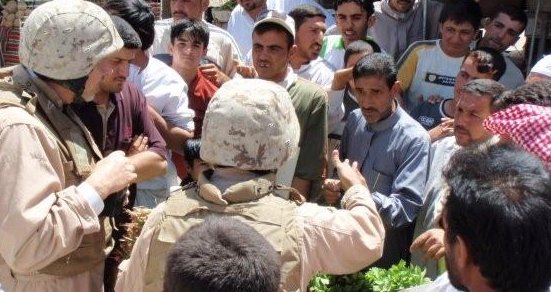
Recent deadly bombings around Iraq, one involving State colleagues, reminded us that this is still a dangerous place, despite the astonishing progress Iraq has made over recent months. I was reminded on a local level during a foot patrol.
The crowd in general was okay, but one guy (he is not in my picture, BTW) was obviously none too happy. I won’t go into details. Suffice to say he was supposed to get compensation for a mistake but when he went to the local authorities to get it they ripped him off, he says. In these situations all you can do is smile and keep in talking/letting them talk, while trying to figure out how to get away. My colleague, Sam, is an excellent interpreter and was able to keep the guy from going too crazy. I am glad the guy had a chance to seek justice and it will probably be good public relations, especially if he is treated fairly. It does, however, point up the dangers inherent in our work and why we must not become complacent. I always worry about some weirdo in the crowd or a guy with a PBIED.
It is very important to go among the Iraqi people to show them we know they are not the enemy, that we are not afraid and that we want to hear what they have to say, sweet and bitter. I bet they will be talking about this particular engagement for a long time to come. The Iraqis present were also surprised and concerned over this man’s anger. I believe our interpreter Sam and I did our duty representing our country in a favorable light and the Marines calmly addressed the situation. Nevertheless, this was a wake-up call about how fast a situation can deteriorate. We have reviewed our security procedures and our team members and I will be much more circumspect in the future.
Nobody is afraid to complain to us. They are usually reasonably happy with Marines and somewhat unhappy with local authorities. While we take some pleasure in being popular, we have to avoid the impression that we are the problem solvers in contrast to local authorities. We will be gone soon. The local authorities will abide and the people have to learn to abide with them. In many ways, they are asking too much too soon from their governments, most of which are newly established after the defeat of the insurgency, but the people are generally on the right track and their requests are legitimate. People always ask about fuel and electricity. They want their streets to be clean and their homes to be secure. Most of all, they want no longer to live in fear. They are also concerned re water. It is a desert, after all.
